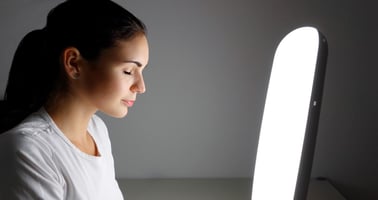Lumateperone Found to Be Effective in Treating Bipolar Depression

Patients with bipolar disorder who are experiencing a major depressive episode may benefit from taking the antipsychotic lumateperone, suggests a study in AJP in Advance. The phase 3 trial, which was funded by Intra-Cellular Therapies (maker of lumateperone), revealed that adults taking lumateperone daily reported significantly greater improvements in their depressive symptoms and overall functioning after six weeks than those taking placebo. Lumateperone was also well tolerated, and participants experienced minimal changes in weight or other metabolic parameters.
“Approved antipsychotics for bipolar depression are associated with a range of undesirable side effects, including cardiometabolic disturbances, motor impairments, and hyperprolactinemia,” wrote Joseph R. Calabrese, M.D., of Case Western Reserve School of Medicine and colleagues. “Thus, a new treatment option that is effective for depressive episodes in both bipolar I and bipolar II disorders and has a more benign and favorable safety profile could improve patient outcomes, with lower morbidity and a higher quality of life.” The authors added that effective medications for treating depressive episodes associated with bipolar II disorder are particularly needed, as only quetiapine is approved as a monotherapy for treating these symptoms.
In this multinational trial, the investigators randomized 381 adults with bipolar I or II disorder who were experiencing a major depressive episode to receive 42 mg lumateperone or placebo daily for six weeks. Safety and efficacy assessments were conducted weekly during the six-week treatment period, as well as during a follow-up two weeks after each participant’s last dose of medication. The main outcomes of interest were the changes in participants’ Montgomery-Åsberg Depression Rating Scale (MADRS) and Clinical Global Impressions Scale–Bipolar Version severity (CGI-BP-S) scores.
After six weeks, average MADRS scores were 4.6 points lower among participants taking lumateperone compared with those taking placebo; 51.1% of adults taking lumateperone responded to the treatment (defined as a drop in MADRS scores from baseline of at least 50%) compared with 36.7% of adults in the placebo group. Statistical differences in symptom improvement between the two groups were evident by the end of the first week. CGI-BP-S scores were also significantly lower among adults taking lumateperone compared with placebo after six weeks.
The rate of side effects in participants taking lumateperone was similar to that of the placebo groups; drowsiness and nausea were the only common side effects more prominent in the lumateperone group. Only 1% of participants in either treatment group reported clinically significant weight gain (≥7% increase from start of study), and no participants exhibited any significant changes in glucose, insulin, triglyceride, or insulin levels. Lumateperone use was also not associated with movement-related extrapyramidal symptoms, outside of one participant who developed mild dyskinesia after six weeks.
To read more on this topic, see the Psychiatric News article “Patients With Refractory Bipolar Depression May Benefit From ECT.”
(Image: iStock/kentarus)
You Have Just Days to Submit Annual Meeting Abstracts
The deadline to submit abstracts of general sessions, courses, and posters for the 2022 APA Annual Meeting is Thursday, September 30, at 5 p.m. ET. Speakers may indicate if they are willing to present in person, present in-person and virtually at a later date, present remotely with a prerecorded lecture and live Q&A, and/or record the session with no live Q&A.
Don't miss out! To learn about newly posted articles in Psychiatric News, please sign up here.






